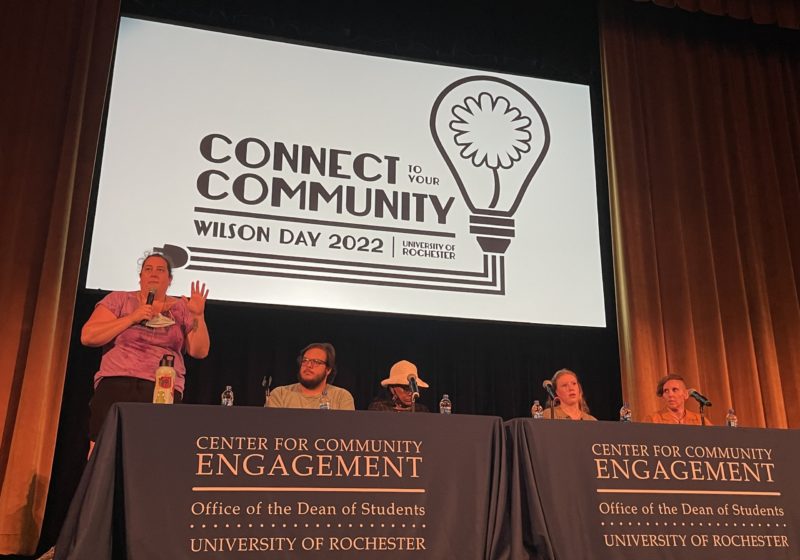First-years packed Strong Auditorium Friday for a panel discussion about university resources that can help them engage with the Rochester community.
The Center for Community Engagement organized the event as part of the Wilson Day of Engagement, which features programming and activities that push students beyond campus to get involved in the city.
First held in 2021 to accommodate COVID-19 pandemic restrictions, CCE Director Glenn Cerosaletti said the panel came in handy again by providing an indoor opportunity for students to learn about getting involved amid a Wilson Day mired by thunderstorms, event cancellations due to staffing shortages, and complexities caused by the large incoming class.
Digging into the experience they picked up while building their community-facing track records, the speakers advised the incoming class about the tools and philosophies that aided them along the way.
The panelists were Rochester Education Justice Initiative’s Assistant Director of Programming Precious Bedell, Sally Gill ‘24, Henry Litsky ‘23 (who is a news editor for the Campus Times), and Associate Professor of Dance Rose Pasquarello Beauchamp. Lauren Caruso, the CCE’s associate director for community-engaged learning, moderated with help from Wilson Day Coordinator Megan Browne ‘23 (who is publisher for the Campus Times).
Litsky spoke highly of the community-engaged learning courses he has taken in pursuit of his Certificate of Achievement in Community-Engaged Learning, each of which included components that pulled students out of the classroom and embraced alternative modes of education.
“You learn so much by going into the community,” he said. “I took this course called “Urban Crime and Justice,” which brought me into the court system. I was in the Rochester City Courts for 50 hours over the course of the semester, watching what was happening firsthand, and talking to a judge after about all the decisions he was making. […] It was really an eye-opening experience for me, and that just wouldn’t have happened if I was only staying on campus.”
He also encouraged checking out the Rochester Urban Fellows program, which places students with local community organizations over the summer and facilitates weekly seminars on urban systems. As a fellow this past summer, Litsky did work with the PathStone Corp., a local nonprofit community development and human services organization.
Gill also pushed into the community last summer, taking part in the Humanities for Life program, which connects students with paid internship opportunities with local nonprofit arts and cultural organizations. Through the program, she worked at two sites teaching dance to kids and seniors.
Three first-years in attendance—Varsha Ramesh, Agnes Siregar, and Neha Soundar—all said they were interested in taking community-engaged learning courses.
“I never have heard of classes that offer community engagement as part of the course, so I thought it was really interesting,” Ramesh said. “I’ve always loved being part of communities, like I’ve volunteered at hospitals and things like that, senior homes. So this is just making me more excited to explore Rochester and what it has to offer.”
Bedell and Pasquarello Beauchamp focused less on University resources, mainly reflecting on more general wisdom gained through their community engagement and the philosophy behind their outreach.
Beauchamp — who co-founded Artists Coalition for Change Together in 2016 to “facilitate intersectional, socio-political dialogue through art and dance,” according to the organization’s website — spoke on the centrality of discomfort to meaningful social justice work and her experience teaching classes that push students into unfamiliar settings, among other things.
“In dance, there’s this phrase: ‘There’s information in discomfort,’” she said. “And discomfort is where social justice happens […] It’s the hard work of negotiation and feeling uncomfortable and being offended and accidentally hurting someone. All of that is what you’ll get out of this, and that’s the stuff that’s gonna make change in the future.”
Informed by decades of decarceral activism, her imprisonment, and experience co-teaching the community-engaged learning course “Incarceration Nation,” Bedell spoke out against carceral attitudes and policies. She spoke to the first-years about the death of Daniel Prude after police held him in custody. She also emphasized that change takes patience and perseverance but that the advocacy experience can have a big pay-off.
“The University has been brave lately,” she said. “When I was a kid, I couldn’t go to this hospital because I was Black. […] The University didn’t have a section where they gave medical services and care to African American people, Hispanic people, or people from the islands. Over the years, they’ve had some things that have happened to help this college understand that we can’t be in here, as professors and teachers and students, a city inside of a city.
“And if you want to do that as a student and just get your education or whatever, life sometimes comes around to show you. Even if you don’t get out and protest or whatever, that’s okay, but the information that you get from community engagement will help you in your suburban community with your neighbors, or help you with your family.”
Editor’s Note (08/30/22): Henry Litsky, a News Editor for the Campus Times, is mentioned in this article. To avoid a conflict of interest, he did not edit this article before its publication.






